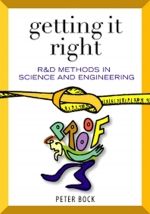Tab Article
Peter Bock developed Getting IT Right in direct response to discussions with the directors of R&D departments in large industrial firms who are frustrated by the lack of coherent and consistent methodologies in the R&D projects they manage.
The Symptoms: Think about your R&D work environment. Do any of these statements ring a bell?
· Research results cannot be reproduced
· Knowledge is precarious and kept primarily in people’s heads
· Speculations are represented as rigorous conclusions
· Data collection is haphazard and hindered politically
· Experiment methods are chaotic: try this, try that
· Project processes cannot be audited because there are no logs or records
· Documentation is incomplete or nonexistent
· Statistical reduction of data is naïve
· Data visualization techniques are poor
· Project activities are isolated and inbred
The Problem: Most engineers and scientists have little formal training in the design and conduct of complex R&D projects. As the focus in industry and academia shifts rapidly toward projects involving complex human-machine interaction, traditional R&D methods are coming up short.
The Solution: The complexity of industrial and academic research and development projects in the 21st century demands a consistent and coherent methodology for their design and execution. This book presents a complete and rigorous methodology for planning and conducting R&D projects, both large and small. The emphasis is focused squarely on Getting It Right:
· Strict adherence to a modernized version of the classical Scientific Method
· Consistent and precise terminology, summarized in an extensive Glossary
· Hierarchical and recursive project planning
· Stepwise refinement and inside-out task design
· Sensible assignment of project resources and management roles
· Political and technical issues for experiment data acquisition
· Fail-soft methods for recursive error recovery
· Rigorous design of carefully controlled experiments
· Comprehensive analysis of potential sources of bias and error
· Statistical methods for data analysis and reduction
· Data visualization techniques and documentation standards
· Highlighted Tips for dealing with common critical problems
· Real-world case studies augmented by detailed figures and tables
· Useful summaries of essential concepts
· Philosophical, ethical, and epistemological constraints and perspectives


